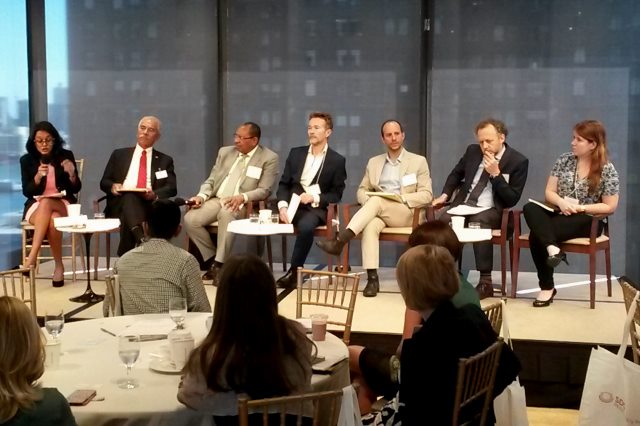Amidst the buzz of the Sustainable Development Summit, philanthropists, development specialists and government officials met in New York last week to discuss opportunities for the philanthropic community to support the new development agenda.
To explore new and innovative ways in which philanthropic capital can accelerate progress towards the new Sustainable Development Goals (SDGs), the Post-2015 Partnership Platform for Philanthropy hosted Philanthropy Engaged: Implementing and Achieving the Post-2015 Agenda at the Ford Foundation headquarters in New York on Thursday, September 24th. The Post-2015 Partnership Platform for Philanthropy is a joint initiative of the United Nations Development Programme (UNDP), Rockefeller Philanthropy Advisors, the Foundation Center, and the Ford, Conrad N. Hilton, and The MasterCard Foundations.
With over 150 people in attendance, the event was opened by Darren Walker, President, Ford Foundation, Helen Clark, Administrator, UNDP and the First Lady of Kenya Mrs. Margaret Kenyatta.
Following the plenary, participants broke into four thematic roundtable sessions. The Mary Robinson Foundation – Climate Justice was honoured to be a convening partner for the session Speeding up Progress to Slow the Impacts of Climate Change. The break-out session sought to understand how philanthropic organisations can integrate climate change actions into their portfolios to achieve climate justice; ensuring that human rights norms are upheld and people in the most vulnerable situations benefit most.
The focus on sustainability in the new goals represents a shift in the global development agenda and this shift is typified by Goal 13, Take urgent action to combat climate change and its impacts. The inclusion of a climate goal under the SDGs is explicit recognition that the impacts of climate change have the potential to undermine or even roll back development progress.
Hadeel Ibrahim, Executive Director of the Mo Ibrahim Foundation and board member of the Mary Robinson Foundation – Climate Justice, spoke of the great potential of philanthropy when introducing the session, saying that philanthropic capital should be the most experimental capital for climate action.
During the panel discussion at this session, President of the Republic of Kiribati, Anote Tong, reminded the participants that climate change is not something that will happen in the future but rather that the people living on the front lines of the climate crisis, in countries like the small island state of Kiribati, are feeling the impacts of climate change today. In fact, the threat of climate change in Kiribati is so great that President Tong has had to consider the evacuation of his island nation – a last resort adaptation strategy based upon education and capacity building which the administration calls “migration with dignity”.
Other panellists included Youba Sokona of the South Centre and co-chair for the Intergovernmental Panel on Climate Change Working Group II during the 5th Assessment Report Process; Bridget Burns of Women’s Environment and Development Organisation (WEDO); Jo Scheuer of UNDP; Ramiro Fernández of Fundación AVINA and Nick Nuttall of the United Nations Framework Convention on Climate Change.
In discussing ways in which the philanthropic community could support the ongoing negotiations around the new climate agreement to be signed in Paris this December, Nick Nuttall suggested that investing capital in existing climate funds could ensure that resources flow to developing nations and help to further political will for an ambitious agreement. He highlighted the Least Developed Countries Fund as an important funding vehicle in need of capitalisation.
When feeding back to the plenary, rapporteur Vikki Spruill, President and CEO, Council of Foundations, offered 5 key opportunities for philanthropic engagement with climate change in the new development agenda:
- Channel greater investment into climate action, particularly adaptation actions
- Enhance integration of climate across philanthropic portfolios and remove silos
- Support the collection and dissemination of enhanced data to allow for risk informed development
- Engage more in the inclusive partnerships that already exist and serve as a bridge between government and the private sector
- Support climate change education
Vikki Spruill concluded by telling the audience that framing climate change as a social justice issue and keeping a human face on the issue of climate change could help philanthropies motivate and support meaningful climate action.
Over the past 15 years, philanthropies contributed almost USD 31 billion towards funding the Millennium Development Goals and 21% of this went towards the environmental goal. In 2012, philanthropies’ grants for climate change totalled just under USD 1 billion.
At the event, the Foundation Center launched SDGfunders, a platform for tracking philanthropic support to the global development agenda.
Related Links
Statement from Mary Robinson on the Adoption of the Sustainable Development Goal
Where Do You Go When Your World Disappears? – Women in the World Summit 2015
Grantham Annual Lecture: Climate Justice – Why is it relevant in 2015?


